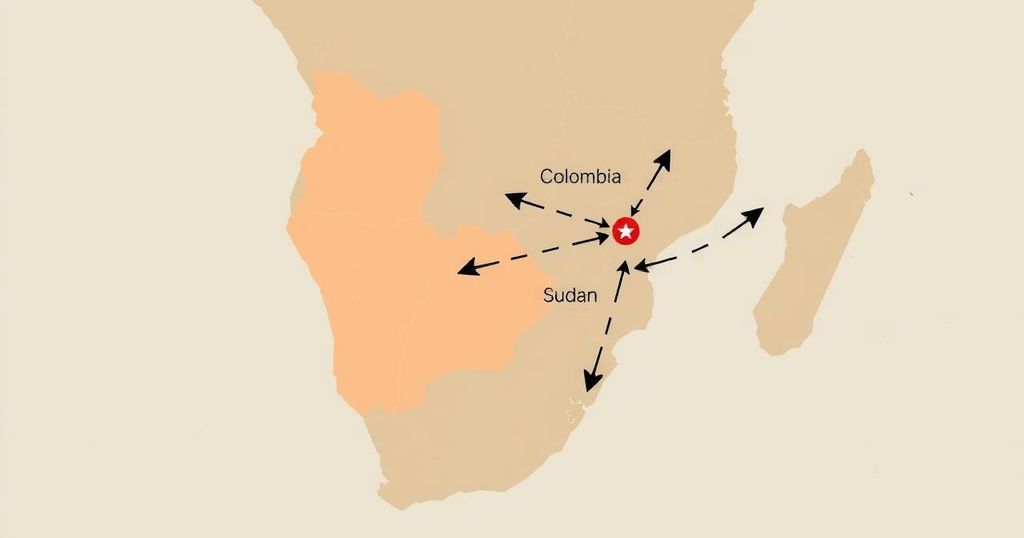The Role of Colombian Mercenaries in the Sudan Conflict: An Examination of International Conflict Dynamics

Colombian mercenaries recently involved in Sudan reflect the internationalization of conflict, leading to significant losses and international apologies. These fighters, recruited by an Emirati company, indicate a larger trend of utilizing former Colombian soldiers in conflicts where economic opportunities are scarce.
A single roadway traverses the Libyan desert connecting the coastal city of Benghazi to al-Uwaynat near Sudan’s northwestern border. This route facilitated the transport of numerous Colombian mercenaries who, in late 2024, joined the Rapid Support Forces (RSF). In November, the Sudanese Armed Forces (SAF) conducted a drone attack on this convoy, resulting in the deaths of 22 Colombian fighters intended for a siege on el-Fasher, North Darfur’s capital, which remains outside RSF control.
Reports from the Colombian media outlet La Silla indicate that these mercenaries were part of a larger group of 300 initially recruited as security personnel in the UAE by Global Security Service Group. Under the UAE’s backing of the RSF against the SAF, at least 40 of these mercenaries were subsequently dispatched to Benghazi and from there to western Sudan. In response to the attack, the Colombian government extended apologies to Sudan’s leadership twice for the involvement of its nationals.
The UAE’s deployment of Colombian mercenaries is not without precedent; in 2015, they also recruited Colombians among a cohort of 450 Latin American mercenaries to combat Houthi forces in Yemen. Evidence of the mercenaries’ presence in Sudan emerged from videos posted by SAF soldiers on social media, showing documents, including a passport belonging to Colombian fighter Lombana Moncayo, found after the convoy attack. British investigative site Bellingcat was able to identify Moncayo’s location utilizing social media activity.
Jeremy McDermott, co-founder of InSight Crime, stated that the UAE is capitalizing on the lack of lucrative opportunities for former Colombian soldiers post-service. He noted the unique combat training and experience that Colombian veterans possess, rendering them more adept compared to soldiers from other nations. Additionally, Colombian mercenaries are often less costly than their international counterparts. La Silla Vacía identified retired Colombian Army Colonel Alvaro Quijano as responsible for orchestrating the recruitment of the 300 mercenaries sent to Sudan via the UAE.
Quijano’s wife, Claudia Viviana Oliveros, owns the International Services Agency A4SI, which employed the mercenaries. A4SI co-founder and retired Colombian Army Major Omar Antonio Rodríguez indicated that recruitment persists despite the fatal incident, with claims that an additional 1,500 mercenaries are being sought for Sudan, a move potentially worth 32 billion pesos (approximately $7.7 million) in annual revenue.
The situation concerning Colombian mercenaries in Sudan exemplifies the internationalization of conflict and the UAE’s strategic use of foreign fighters. The Colombian government’s express apologies underscore the complexities surrounding their nationals’ involvement in foreign conflicts while the prospect of significant profits from recruitment signals ongoing issues within the international mercenary landscape.
Original Source: www.defenceweb.co.za








